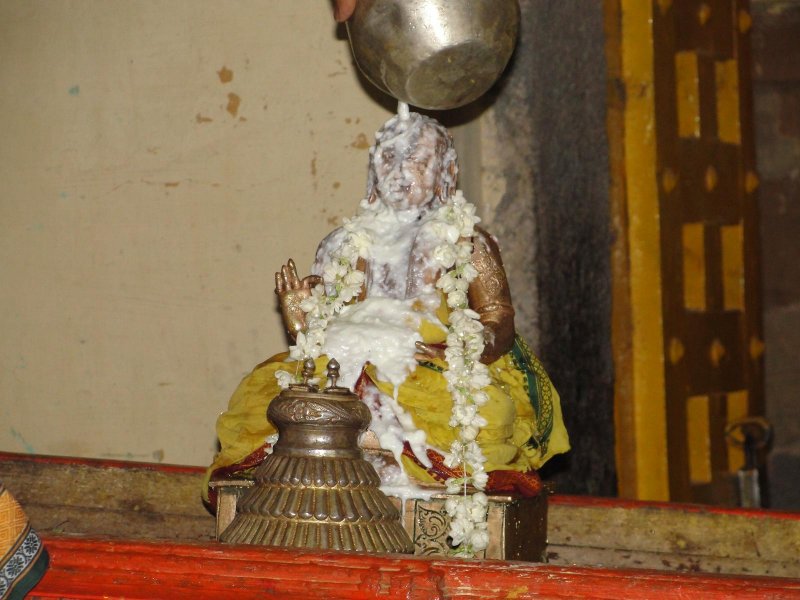Published from “Three Minutes” series written by A.S.Rajagopalan Swami of Ohio.
 nivAsa shayyAsana pAdukAMshuko- padhAna varshAtapa vAraNAdibhiH sharIra bhedaistava sheShathaM gathaiH
nivAsa shayyAsana pAdukAMshuko- padhAna varshAtapa vAraNAdibhiH sharIra bhedaistava sheShathaM gathaiH
yathocitam sheSha itIrite janaiH
(svAmi ALavandAr, stotraratnam – 40)
nivAsa = (Assumes the form of) residence
shayyA = soft bed
Asana = beautiful throne pAdukA = nice footwear aMshuka = garments
upadAna = pillow
vAraNa = umbrella,
varShAtapa = (to protect from) rain and sun light
AdibhiH = more and more
sharIra = of forms
bhedaiH = (with) a variety of
tava = of You
sheShatAm = being as supplies
gataiH = attained
yatha = as
ucitam =pleasingly appropriate
sheSha = servant
itIrite = this is called
janaiH = by people
This verse is found in stotraratnam composed by yAmunAcAriAr, commonly known as svAmi ALavandAr. Five of ALavandAr’s disciples later went on to become svAmi rAmAnuja’s teachers (AcArya). ALavandAr is considered to be one of the foremost AcArya-s in the shrIvaiShNava lineage. He firmly believed and spread the idea of service to the Lord (kaiMkaryam) as the only ultimate goal (puruShArtham) and total surrender (prapatti) is the only plausible means (upAyam), which liberate one from the bondage of birth/death cycle (samsAra)
Here, ALavandAr describes the service rendered by ananta (Adi sheShan), usually denoted as Lord’s serpent bed. The name sheSha perfectly suits him. Why? The definition of sheSha is “one whose existence is merely for the service to another”. No one can ever serve the Lord as much or as close as him. He transforms himself into to that serviceable form; as a home, bed, throne, sandals, clothing, pillow, umbrella, and other material to protect shrIman nArAyaNa from water, sun and and other elements. He is not separated from the Lord by time (kAla), space (desha), or state (avasthAi). The Adi sheSha is like a shadow who waiting eagerly to perform the service.
Eternals (nityasUri-s) who reside in shrIvaikuNTham have no attachment to accumulated deeds (karma). They stay ever in their abode of hrIvaikuNTham and are beyond birth/death cycles (samsAra) like us. They are called bond-free. Even among them, ananta is mentioned first before anyone else; like Lord’s vehicle bird (GaruDa), Lord’s chief operating officer (Vishvaksena). You may ask why such an high honor is given to him? ALavandAr describes here that because you can’t separate ananta from the Lord. Whatever the Lord wants to do, ananta changes himself immediately to that posture and serves Him. When the Lord descends down to the earth, ananta accompanies Him. When Lord came as rAma and KR^iShNa, he too came down as lakShmaNa and balarAma. In nR^isimha avatAra, ananta was serving as Lord’s sandals (pAduka) and so on. Poigai AzhvAr (first shrI vaiShaNava saint) has composed a similar verse in Tamil (senRAl kuDaiyAm….).
There is a story about rAma that when rAma was born He was crying continuously to the point that no one could pacify Him. All the doctors, nurses, maids tried to no avail. Finally they called the guru VasiShTha. VasiShTha looked for a moment and said, “This is easy. Bring lakShmaNa and put him next to rAma in His crib. rAma’s problem is separation from ananta”. Baby rAma stopped crying once lakShmaNa was next to him. Thus ananta gives the true meaning for “through thick and thin”.
What we learn from here
- True servitude is void of any self-emotion or self-use.
No point in saying “aDiyEn” or “dAsan” without following what it entails.
- Service should be at all times, places and states.
Don’t restrict yourself serving the parents or elders at certain times only. Don’t be afraid; True bhAgavata-s, as receivers of your service, will always look ahead and won’t do anything to hurt you or your things.
3. Take pride in service.
It is not a menial task; It takes great honor, a great mind to bend down.
Only a life lived for others is a life worthwhile. (Albert Einstein)








